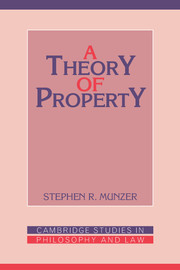Book contents
- Frontmatter
- Contents
- Preface and acknowledgments
- 1 Property, justification, and evaluation
- Part I Property rights and personal rights
- Part II From individuals to social context
- Part III Justification and distributive equity
- Part IV Applications
- 12 Business corporations
- 13 Gratuitous transfers
- 14 A moral and political theory of takings
- 15 Takings and the constitution
- Table of cases
- Index of names
- Index of subjects
12 - Business corporations
Published online by Cambridge University Press: 05 June 2012
- Frontmatter
- Contents
- Preface and acknowledgments
- 1 Property, justification, and evaluation
- Part I Property rights and personal rights
- Part II From individuals to social context
- Part III Justification and distributive equity
- Part IV Applications
- 12 Business corporations
- 13 Gratuitous transfers
- 14 A moral and political theory of takings
- 15 Takings and the constitution
- Table of cases
- Index of names
- Index of subjects
Summary
THE ITINERARY
So far this book has proposed what will be called the basic theory of property. It consists of the analysis of the concept of property in Part I; the background theory of property in Part II; and, in Part III, the principles of utility and efficiency, justice and equality, and desert based on labor, together with the account of the relations and the resolution of conflicts between or among the principles. The task now is to apply the basic theory to specific problems. Though the theory illuminates all problems of property, this Part IV will discuss a few problems in at least moderate depth rather than aim the theory in a scattershot fashion at a host of problems.
This chapter applies the basic theory to a general problem of economic organization: How should business corporations be structured and operated in both a private-property economy (§ 5.1) and a socialist economy? This problem, though quite broad, is narrower than it might have been. For this chapter does not consider either nonbusiness corporations, such as charitable corporations, or noncorporate business entities, such as partnerships or individual proprietorships. Furthermore, it does not deal with issues pertaining to business corporations other than “structure” – ownership and control – and “operation” – standards of corporate behavior and responsibility. Nevertheless, if the chapter is sound, it may shed indirect light on other issues, such as securities regulation, and on charitable corporations or noncorporate firms.
- Type
- Chapter
- Information
- A Theory of Property , pp. 317 - 379Publisher: Cambridge University PressPrint publication year: 1990

